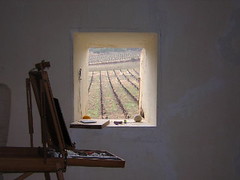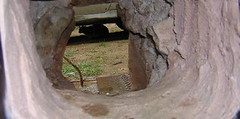rainy day

They are already rationing water near Lourmarin, I hear, so I am happy it is finally pissing down here - for the prematurely parched earth and thirsty blooms at least, but the timing is rubbish since I am finally home and up for almond blossom tours on foot and bicyclette!
The cats hate it: They go from curly entwining of fur on the bed, tentatively through the cat flap, to the dry place underneath the megane. From here they watch this strange non-Provencal phenomenon: Rain.
Julian has set up violets and an easel upstairs and is going slowly about today's painting.
Yesterday was the last whizz to Grenoble and I am back with the usual assortment of sentiments: Relief, mourning, love, excitement, emptiness, boredom, wife-belonging, little-girl-lost....Julian and I have had our usual space adjustment row (over our neighbour's home made foie gras and a celebratory -why not today?- 1995 bottle of sauternes) about computers at the dinner table followed by a sleepless night.
The prima donna's homecoming is not supposed to be like this.
And yet, is it not these quiet in-between times - of subdued light, emptiness and silence (well, Gillian Welch is playing on the cd, does that count?) - which recharge us if we will allow them? That's what they say, so I am trying (and mostly failing because I am a crap Buddhist) not to fight it.
Mirella's last rehearsal yesterday was full of the wisdom of the rainy day; the breath within the phrase; the 'vergule' within the text. Guiding the actors through their words from the Chartreuse de Parme (on which we, the orchestra, were commenting musically) she explored the comma - the silence - as the place where you grab rather than lose your listener's attention; and the big word - in this case 'tué'- as something which could be more powerful drained rather than full of emotion.
I was reminded of Roland Barthes who says about the violin and cello melody in the Andante of Schubert's first piano trio:
"All I can say is that it sings, it sings simply, terribly, at the limits of the possible. But is it not surprising that this assumption of song to its essence, this musical action by which song seems to manifest itself in all its glory, should occur precisely without the collaboration of the organ which constitutes song, i.e., the voice? It would seem that the human voice is here all the more present in that it has delegated itself to other instruments, the strings: the substitute becomes more real than the original, the violin and the cello 'sing' better or, to be exact, 'sing' more than the soprano or the baritone, because, if there is a signification of sensuous phenomena, it is always in displacement, in substitution, i.e., ultimately, in absence that it is most brilliantly manifest."
The word tué was like this, heartbreaking because of the very absence of emotion.
We can all, I'm sure, live our philosophies more easily through art than through life, but through our art we can at least taste perfection together for a moment; swirl it round our palettes, feel it at the tips of our tongues, and at the backs of our throats. Now the show is over we spit, dash for a train and return to our chaotic lives.
Mirella was working on a line about the Countess improvising on her piano alone at night. The actor's timbre had a a gauzy curtain of romance around it. We thought louvred shutters, long tresses, the tinkling of ivories - all the normal clichés.
"Believe me" Mirella said.
"I have played the piano alone at night, and it is not romantic"

-And she, like the rest of us, returns to her unglamorous life.






1 Comments:
"but through our art we can at least taste perfection together for a moment"
that's such a lovely phrase - I have felt a little the same in a gallery or playing in an orchestra.
Post a Comment
<< Home